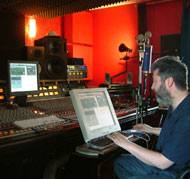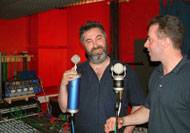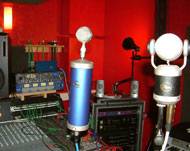A Massive Collective
Effort: Recording '100th Window' (focusrite)

Charles Jennings' book of the same name referred to the theory that no
system is totally secure, in that if you lock 99 of 100 windows, the
good thief will enter the 100th. So I suppose it's the best analogy to
use for Massive Attack at the present time (or indeed at any point in
their history)... whatever possible expectations and predetermined directions
that you think they might take with their music output, you're always
surprised by that one single possibility that you hadn't considered.
While this novel, and pleasantly refreshing approach is part of the live stage
experience that is Massive Attack on tour, it's in the studio that this formula
and method of working really makes itself apparent. At the centre of this is
one man in particular. As a relatively new influence on the Massive collective
since Mezzanine, and at the core of the production of 100th Window, producer
Neil Davidge speaks about his recording techniques, experiences working with
3D and the band, and his favourite bits of gear...
It's been a while now since you got involved with the third Massive Attack
album, Mezzanine. How did this come about, as I gather you had worked on some
collaborative projects prior to that?
The first track was for the Batman Forever album, a track called The Hunter,
featuring Tracy Thorn. The Insects* started the track but were unable to finish
it due to other commitments. I was introduced to the guys by Andy Allen, owner
of the Coach House studios in Bristol.
*Tim
Norfolk and Bob Locke who wrote "Karma Coma" and "Euro
Child" for the 'Protection' album.
I presume your original intention was to get onboard in a more engineering
and programming capacity, but it seems to have gone far beyond that now. What
was the spark that led to you driving the project with D?
I've
never considered myself to be 'just a…', I'm a jack of all. I started
out as a bassist, moved on to guitar, song writing, computers, started singing,
got a deal, did some remixes, wrote, recorded and produced other people etc.
This experience has helped me understand the whole process and enabled me to
help others. I can often spot what someone needs before they realise it themselves
and explain it in an everyday way without making them feel like an idiot. Dee
at the time of making 'Mezz' was becoming more aware of the potential of taking
live music and fusing it with technology and needed someone who could both
understand him and then explain it to the band. I also, whilst the band was
on tour, would be left to my own devices. Not being content to just wait for
them to come back I would continue working on the tracks, putting more and
more of myself into them and luckily Dee in particular liked a lot of what
I'd done.
How easy was it to communicate musical ideas with D and the rest of the band,
particularly when they were not classically trained in the traditional music
sense at least?
I found it easy. In college I studied graphic design and so have a way of
'looking' at things, which is similar to Dee's. I also have no formal music
training and had to pick things up over the years relating what I was hearing
to what I felt.
Your partnership with D on the 100th Window seems to be the basic building
block of its completion, how did this work in terms of either one or both of
you being in the studio? Did you work alone or as a team most of the time,
and how did you involve the other musicians?
To be honest, 100th Window in general was a lonely album to make - we cut
ourselves off from the world and sometimes from each other. This wasn't by
design but a reaction to the constant pressure to be original. With 'Mezz'
we almost stumbled over a sound. Never ones to rest on a method though, Dee
and I chose to throw away the book and start afresh, easier said than done!
There were periods where neither of us new why we were doing this anymore,
leading to a lot of frustration. And then after a long holiday it came together!
We all just started doing what we do without using our heads too much. You
should only use your brain when things are going wrong, the rest of the time
listen to your gut!
The fourth album seemed to be 'on the brew' for quite some time, and I gather
a huge amount of material never made it off the sketch pad, as it were. What
processes were you actually going through in the studio at that time?
In the beginning we prepared loops to jam to, we then booked into Ridge Farm
Studios for two weeks and took along a bunch of musicians. Here we recorded
over ten hours of music on to Pro Tools with a view to using it as a sample
resource for loops and the like. What we ended up with though were great performances
that didn't sound like Massive Attack and when separated from the rest lost
all their appeal. A dead end! After a while arsing around we scrapped the lot
and went back to a simpler approach, looping, building, stripping back and
then building again. For a band that don't write songs as such this seems to
be the most effective way of working.
You use Pro Tools rigs for the basis of your recording, how long have you
worked on this system and what are the main differences it has made to your
working methods (compared to analogue recording traditionally, for example)?
I've used Pro Tools now for about five years although I did have sound tools
on the Atari when it first came out. So I am totally 'down' with the concept
of chopping and rearranging in audio. These days I tend to always record even
when musicians/vocalists are running along with the track for the first time.
I want to capture the idea when it is conceived not when the life has been
rehearsed out of it. With Pro Tools I can always shift the part around, re-tune
or re-time it adding in variation thru comping. It always used to frustrate
me hearing what was a genius performance lost thru excessive dropping in trying
to get it perfect. This way I can capture the spirit and have complete confidence
that it will never be lost. If it is then improved upon, so be it, but I can
always go back even if it is just for reference.
In terms of processing I expect you still rely on, or prefer to use, outboard
channel gear as opposed to plug-ins? What makes up the mainstay of your signal
path?
It depends. We mainly use outboard in the recording and mixing stages. There
are huge advantages to using plug-ins in the writing / arranging stages, there's
the fact that you don't have to commit to EQ and compression, you can save
and recall your track with the minimum of fuss and automation of plug-ins is
very handy for problematic sounds. Quality outboard though is invaluable when
you're talking about capturing live stuff; plug-in EQ and compression can make
recordings sound flat and lifeless, small and indistinct.
While
on the subject, I noticed that you have recently added some of the new Focusrite
processors
to your
armoury, including the ISA 428 Pre Pack and the
revamped VM Pro – what attracted you to these, and how will it complement
your existing Focusrite outboard?
Focusrite
have always been at the top of their game. There are plenty of companies making
weird and
wonderful
processors but few are as instant as Focusrite in
delivering the required results. The VM Pro speaks for itself, an all round
vocal processing solution. In the past we've always had these convoluted chains,
sometimes running vocals thru ten grand worth of gear, now it's one box! The
ISA Pre Pack, however, was something Focusrite sent down for me to try out
and to be honest I had no intention of buying, but then I heard it!!! We recorded
drums thru it switching thru the various impedances, what a difference. It
goes without saying I didn't send it back (but you did pay for it of course! – Ed)
 With
regard to vocals, which are obviously a crucial characteristic element of Massive
Attack, how did you go about recording the varied singers and vocal contributors
to both Mezzanine and 100th Window?
With
regard to vocals, which are obviously a crucial characteristic element of Massive
Attack, how did you go about recording the varied singers and vocal contributors
to both Mezzanine and 100th Window?
In general I prefer to do vocals in the control room, sat down with headphones.
It's important for me to understand what the vocalist is thinking as they are
singing, to help me do this I watch their body language as much as anything.
I also think they feel more at ease. There is nothing worse than singing your
heart out then waiting for the talkback button to be pressed. Sometimes I talk
to a singer thru the intro to a song to stop them over analysing, sometimes
I show them how to stop and start Pro Tools so that they can sit on their own
and work out their approach. It's the most crucial stage of a track and the
most personal one, so you have to be prepared to do anything to make the singer
feel comfortable
With the likes of Horace Andy, Liz Fraser, D himself, and of course Sinead
O'Connor (in 100th Window) all having had your production treatment; what qualities
in a singer do you think are most important to the Massive sound?
Personality, honesty, a unique attitude!
 As well as the recording
and processing, you also have a reputation for being seriously creative in
sound design and manipulation. What sound modules and synths
do you have close to hand, and are there any plug-ins that you feel are the
business
right now?
As well as the recording
and processing, you also have a reputation for being seriously creative in
sound design and manipulation. What sound modules and synths
do you have close to hand, and are there any plug-ins that you feel are the
business
right now?
A lot of the time it's in the editing. I do have a lot of plug-ins, software
synths, giga sampler plus keyboards, guitars etc, but quite often I try to
limit myself so that I have to use my initiative and as a result make the music
sound more original. The main plug-ins I use are pitching and time stretching
ones especially because I like to take something from one context and bring
it in to another.
What other projects do you have on the boil just now, anything imminent?
I have recently set up a production company with my manager (Called 7hz Productions)
and our first signing is a female singer songwriter going under the name of
'Pocket Angel'. It's a fairly diverse project ranging from pop to rock with
a nod to the bizarre and the cool. The songs are personal and insightful, pop
has been given a bad name in the last twenty years or so, this is a return
to its heyday with more in common with the Beatles than Kylie!
Aside from the time in the studio, what else do you focus your creative energies
on? I gather you have a background in design?
I'm afraid that I have little time to spend outside of the studio. An average
working day is around twelve hours, often more and sometimes seven days a week.
What time I do have left is spent recovering or with my family. This business
is all consuming, something any aspiring person needs to recognise, my advice
to anyone up and coming is find an understanding partner.
Neil, thank you very much for taking the time to speak to us! We'll let you
get back to the real business.
Cheers!
http://www.focusrite.com/features/neil.html








